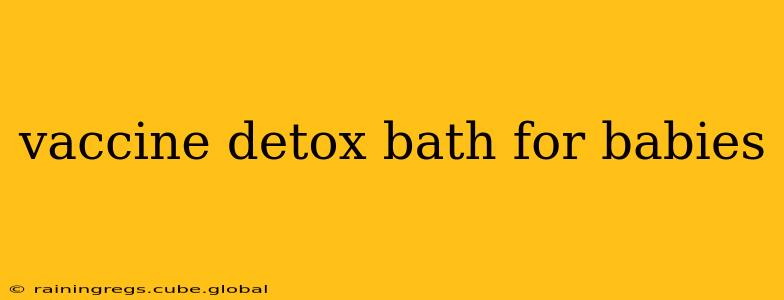Vaccine Detox Baths for Babies: Separating Fact from Fiction
The idea of a "vaccine detox bath" for babies is a concerning one, circulating largely through misinformation and misunderstanding of how vaccines and the body work. There's no scientific evidence to support the claim that vaccines require detoxification, and attempting such a "detox" can be dangerous for your baby. This article will explore the reasons why these baths are not recommended and offer evidence-based information on infant health and well-being.
Is there such a thing as a vaccine detox bath for babies?
No, there is no scientific basis for the existence of a "vaccine detox bath" for babies. Vaccines are meticulously developed and rigorously tested to ensure safety and efficacy. The body's natural processes effectively eliminate any components of the vaccine that are not needed. Claims suggesting otherwise are often based on misinformation and lack credible scientific support. Promoting such practices can be detrimental to public health and the well-being of vulnerable infants.
What are the supposed benefits of a vaccine detox bath?
Proponents of vaccine detox baths often claim they help remove toxins from the body after vaccination. However, these claims are not supported by any credible scientific evidence. The body's own systems, including the liver and kidneys, are highly efficient at processing and eliminating waste products, including any components of the vaccine that are not utilized by the immune system.
Are there any risks associated with a vaccine detox bath for babies?
Yes, attempting to "detox" a baby after vaccination carries significant risks. The ingredients used in these baths, often essential oils or other substances, can be harmful to a baby's delicate skin, leading to irritation, allergic reactions, or even more serious complications. Furthermore, delaying or forgoing necessary medical care based on unfounded beliefs can have severe consequences for the baby's health.
What are the recommended ways to care for a baby after vaccination?
After vaccination, it's crucial to follow your pediatrician's recommendations. This typically includes monitoring your baby for any adverse reactions, such as fever or soreness at the injection site. These reactions are usually mild and temporary. If you have concerns or notice any unusual symptoms, consult your pediatrician immediately. Providing your baby with comfort measures, like gentle cuddles and age-appropriate pain relief (as recommended by your doctor), can also be beneficial.
What are the symptoms of a vaccine reaction and when should I contact my doctor?
Common, mild side effects of vaccines include redness, swelling, or tenderness at the injection site, mild fever, fussiness, or drowsiness. However, it's crucial to contact your doctor immediately if your baby experiences:
- High fever (above 101°F or 38.3°C rectally)
- Seizures
- Difficulty breathing
- Severe allergic reaction (e.g., hives, swelling of the face or throat)
- Persistent crying or inconsolable distress
Why is it important to trust credible sources of information about vaccines?
Misinformation surrounding vaccines can be dangerous. It's essential to rely on credible sources of information, such as your pediatrician, the CDC (Centers for Disease Control and Prevention), and the WHO (World Health Organization), for accurate and up-to-date information about vaccines and their safety.
Conclusion:
There is no scientific evidence supporting the use of "vaccine detox baths" for babies. These practices can be harmful and potentially dangerous. Always consult your pediatrician for advice on caring for your baby after vaccination, and trust credible sources of information about vaccine safety and efficacy. Prioritizing evidence-based practices is crucial for ensuring your baby's health and well-being.
